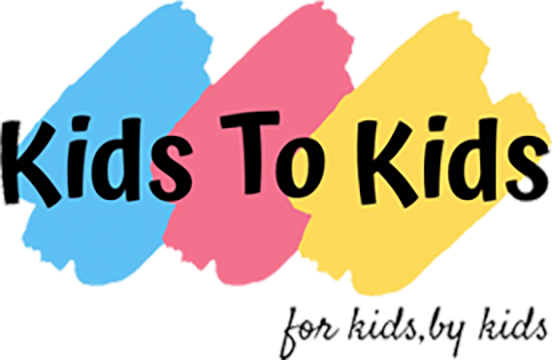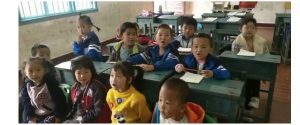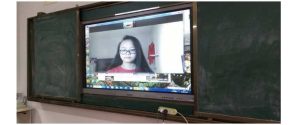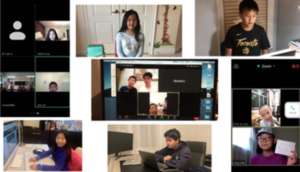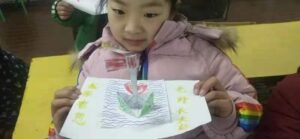Find Us On The Media
Canadian KTK organization’s volunteer English teaching activities for children in Xiangxi.
2021-09-09 08:45 Views: Over 13,000
Chinese Account: Chinese Headlines – Toronto
Editor’s note: The Kids To Kids club, founded by a group of middle and high school students from Toronto, has been voluntarily teaching English to children in Xiangxi for over a year and now hopes for more volunteers to join. Its members, coming from various schools and age groups, have been voluntarily teaching English at a remote mountain school in Xiangxi since June 2020. With over a year of experience, they plan to offer additional tutoring sessions for local students in the future.
Text: Grace
Since March this year, Ontario, with a high population density and severe pandemic conditions, quickly implemented public space restrictions, stay-at-home orders, closures of schools, daycare centers, and entertainment facilities, and prohibited large gatherings.
Students had to study from home, separated from friends and family, enduring endless handwashing, and feeling their parents’ anxiety and helplessness. Quarantine forced them to adapt to an isolated lifestyle, with the initial novelty soon giving way to confusion and depression.
By the end of May, a parent in Toronto, having chatted with a friend who had supported mountain schools for years, learned about the situation at Sicheng Primary School in Lingxi Town, Yongshun County, Xiangxi Autonomous Region. The remote area, primarily inhabited by left-behind children and the elderly, relied on community funds to hire teachers. The school had only one teacher, Mr. Xiang, and students from nearby villages would hike two hours each morning to attend classes. Despite the harsh conditions, Mr. Xiang’s dedication ensured that students participated in national educational assessments. However, the school lacked English lessons as Mr. Xiang did not speak the language.
A Toronto parent suggested that their middle school child teach English at Sicheng Primary School. Surprisingly, the child eagerly agreed and enlisted several friends to help. They quickly organized an online meeting, developed a syllabus for students with no English background, and gathered teaching materials, combining Chinese educational textbooks with Canadian ones. They formed teams of two, assigning tasks and establishing communication methods. By June, they began teaching two classes per week, scheduled from 8:30-9:30 AM Beijing time, which corresponded to 8:30-9:30 PM in Toronto.
Due to the school’s remote location and lack of internet, the only connection available was through Mr. Xiang’s old mobile phone. During their first class, Mr. Xiang propped his small phone on a desk, and the elementary students huddled around it, their faces close to the screen, displaying their clear, eager eyes. The students, in second grade, participated in their first English lesson without fuss. They shyly repeated each letter and word spoken by their young teachers.
The teachers, all local Toronto middle and high school students, prepared thoroughly to ensure the students could understand the entire English lesson. They included images and explanations in both Chinese and English for the taught letters and words. If they didn’t know a Chinese term, they would look it up online in advance. This collaborative teaching and learning approach led to moments like Richard asking during a lesson, “Andrew, do you know how to say this in Chinese?” “I don’t know either,” Andrew would respond, “wait, I am checking it online.” “Okay, got it!”
As summer arrived, the volunteer teachers and students continued to learn together until the last class before summer break, coinciding with Canada Day. Fireworks lit up the night sky as Richard cheerfully wished the students a happy summer holiday.
In July, Mr. Xiang mentioned that two students’ parents had smartphones with internet access, hoping to continue English lessons over the summer break. Leo and Ryan volunteered to keep teaching these students.
As private tutoring costs are high in China, English tutoring represents an additional financial burden for many families. As Chinese schools started their summer holidays, more parents inquired about English classes. The volunteer teachers sacrificed their holiday leisure time to take on the challenge, each teacher pairing with a student. As word spread, more students signed up for lessons, and new volunteers like Vivienne, Gillian, Rico, Rex, Fredrick, Freyah, and Nikki from California joined the group, now named the Kids to Kids club. They saw themselves as students teaching younger students, aiming to foster mutual learning and encouragement.
July and August were busy months. The teachers worked diligently, receiving grateful messages from parents as their students not only learned English but also experienced different cultures and received encouragement. The lessons were not only about language but also cultural exchange and character building.
For the 2020-2021 academic year, the volunteer teachers continued to teach as schools shifted to online classes due to the pandemic. They maintained their dedication, preparing lessons and urging each other to stay on schedule. Hearing their students’ voices mimic the lessons brought smiles to their faces.
The English lessons significantly benefited the students at Sicheng Primary School. By the end of the year, first graders could greet, introduce themselves, and carry on everyday conversations in English, giving them an edge over their peers.
As June 2021 approached, marking the end of the school year, it was a unique June for the Kids to Kids teachers. They had experienced a year of school closures, online classes, and home quarantine. Despite the recurring pandemic, they continued their education, adapting to the new normal and learning to advance through adversity.
With the next school year on the horizon in September, the team was ready for new challenges. The group planned to continue teaching English at Sicheng Primary School and expand their support to local students. The Kids to Kids club, a new team, invited peers to step out of their comfort zones, develop their willpower, enhance their abilities, and improve their interpersonal skills. They aimed to assist students from low-income families, communities, and institutions to perform better in school and lead them toward a brighter future.
Small story:
Last year, Sicheng Primary School had five female and eight male students. The KTK teachers selected English names similar in sound and meaning to each student’s Chinese name, allowing the students to choose their preferred English names.
Student Tony, living with his grandparents while his parents worked away, had the loudest voice during English practice, making him a favorite among the young teachers.
As the Chinese New Year approached, the KTK teachers decided to send the students warm scarves and hats for their mountainous journeys to school, along with handwritten New Year cards with Chinese blessings.
When school resumed in spring, the students made wish cards to send back to their teachers. Mr. Xiang photographed each card and sent the images back. Student Alice’s card featured a boat adorned with a red flag and a heart, with the message, “Teacher, I will come to see you when I grow up!”
Knowing that this report was being published, Mr. Xiang wrote a handwritten thank-you letter.
Mr. Xiang also shared the history of the school and its student background.
The top left image is Mr. Xiang’s invitation letter for the KTK English classes; the bottom center shows Sicheng Primary School students playing a game during recess; the top right shows the students eating dumplings (lunch provided by the school, with Mr. Xiang also working in the kitchen); the bottom right features a 3D thank-you card made by student Angela, which is very exquisite.

The lovely students of Sicheng School and the dedicated Mr. Xiang!
As Ontario lifted the stay-at-home order, KTK members gathered. The young teachers, who had collaborated well during online English classes, met in person for the first time outside of class.
